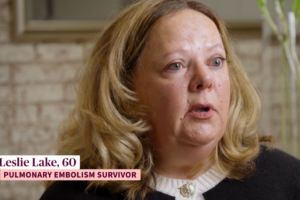Blood Clot FAQs – Cancer and Blood Clots
By Elizabeth Varga, MS; Chair – Education Committee, NBCA
I have heard that often people diagnosed with deep vein thrombosis (DVT) are evaluated to see if they have an underlying cancer that triggered the clot. Why is that?
This does not happen often, because testing to detect cancer is done only in those patients who show signs that suggest cancer may be present, such as unexplained weight loss or infection. About 10% of people who have DVT/PE will be diagnosed with cancer within 12 months after a DVT or PE. In some cases, with blood clots that do not seem to have any known cause, there may be a need for a more extensive work-up to look for an underlying cancer.
Why does having cancer increase the chance of developing a DVT/PE?
While this is not fully understood, it is thought that cancer may lead to tissue damage and inflammatory responses that lead to activation of the blood clotting (coagulation) system. Tumors also release chemicals which trigger clotting.
Are certain cancers more likely to result in DVT/PE?
Yes. Cancers of the brain, ovary, pancreas, colon, stomach, lung and kidney have the highest risk of DVT/PE. Lymphomas, leukemia, and liver cancer are also more likely to lead to DVT/PE.
Do cancer treatments, like chemotherapy, increase the risk for DVT/PE?
Yes, some chemotherapies are associated with a higher risk of blood clots. Some examples include Thalidomide and Lenalidomide to treat multiple myeloma, Avastin® to treat colon cancer, and certain chemotherapies that may be given in combination with others, including cyclophosphamide (Cytoxan®), chlorambucil (Leukeran®) and nitrogen mustard (Mustargen®). It is not well known why chemotherapy increases risk of DVT/PE, but it is suspected that this could be because they cause damage to blood vessels or reduce the production of proteins that protect us from clots. Women treated with tamoxifen to prevent or treat breast cancer are also at increased risk. Erythropoietin, which is sometimes used to treat anemia and improve quality of life in cancer patients receiving chemotherapy, may also increase the chance of developing a blood clot.
What other risk factors might make it more likely for a cancer patient to clot?
Having surgery to remove the cancer, particularly abdominal and pelvic surgery increases risk. Being hospitalized, immobile, or having a central venous catheter placed (for chemotherapy or other reasons) also increases risk. Risk goes up as age increases, and having a family history of DVT/PE or a pre-existing inherited or acquired thrombophilia makes it more likely for a cancer patient to clot.
What can be done to help prevent DVT/PE in cancer patients?
Clotting risk should be assessed in all patients with cancer. Whenever a patient with cancer is hospitalized, s/he should ask about treatment to prevent DVT or PE. Treatment to prevent blood clots should be routine in any hospitalized patient, and usually consists of injections of heparin or low molecular weight heparin. Compression stockings or pneumatic devices are also used to help prevent blood clots. Patients with cancer who are home and can move around have a lower likelihood of developing DVT/PE. However, patients should be aware of signs and symptoms of DVT/PE and seek immediate attention when they notice them.
If I have cancer and develop a blood clot, how is it treated? Am I at higher risk to develop a second blood clot?
Once a cancer patient develops a first episode of DVT/ PE, he or she is typically treated with “blood thinners” (injections of low molecular weight heparin or with the oral drug warfarin) as long as the cancer is active, because the risk for another episode of VTE is high if blood thinners are stopped.
Reference: The Surgeon General’s Call to Action to Prevent Deep Vein Thrombosis and Pulmonary Embolism, 2008.




